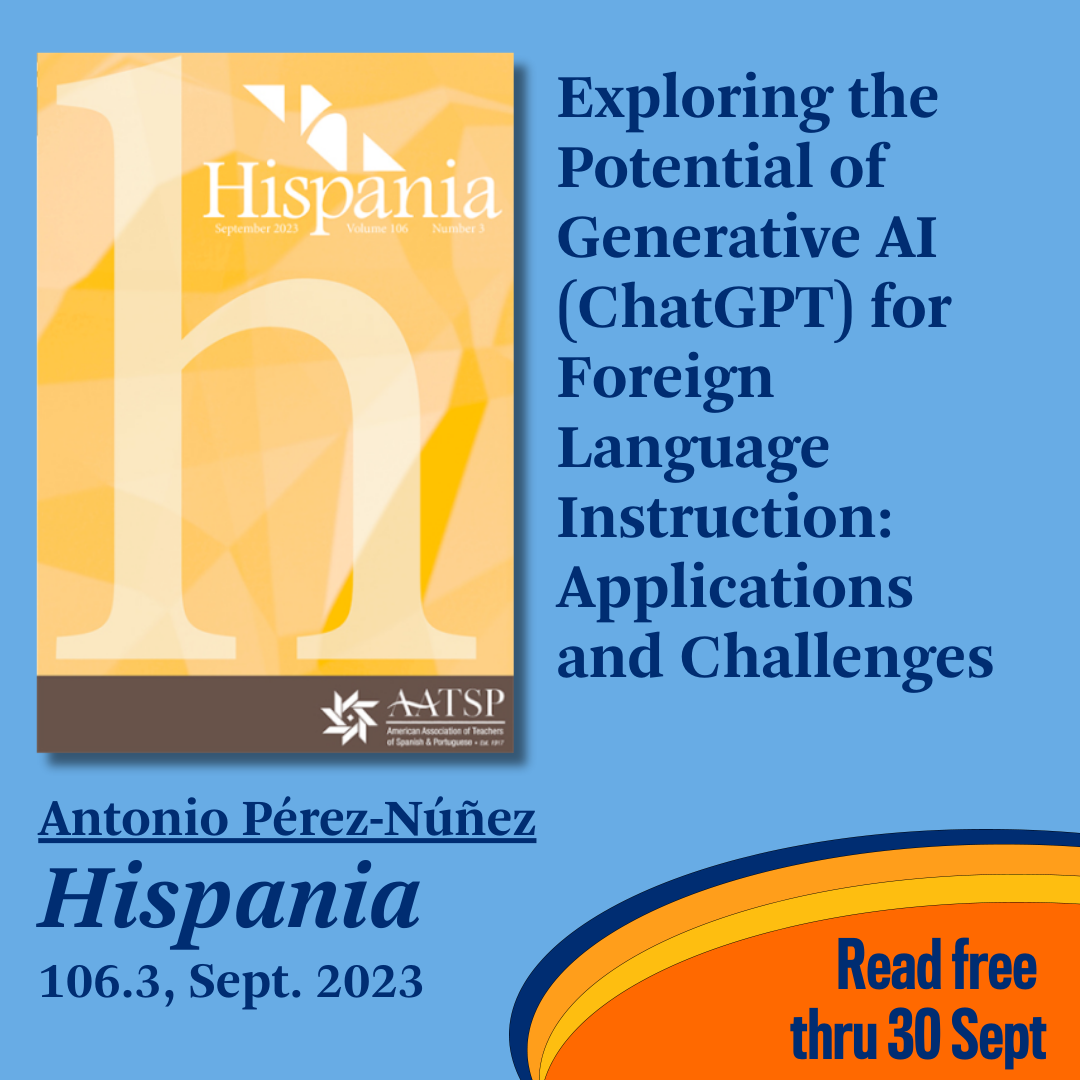
Johns Hopkins UniversityEst. 1876
America’s First Research University
ICYMI: New & Notable Articles (23 Sept 2024)

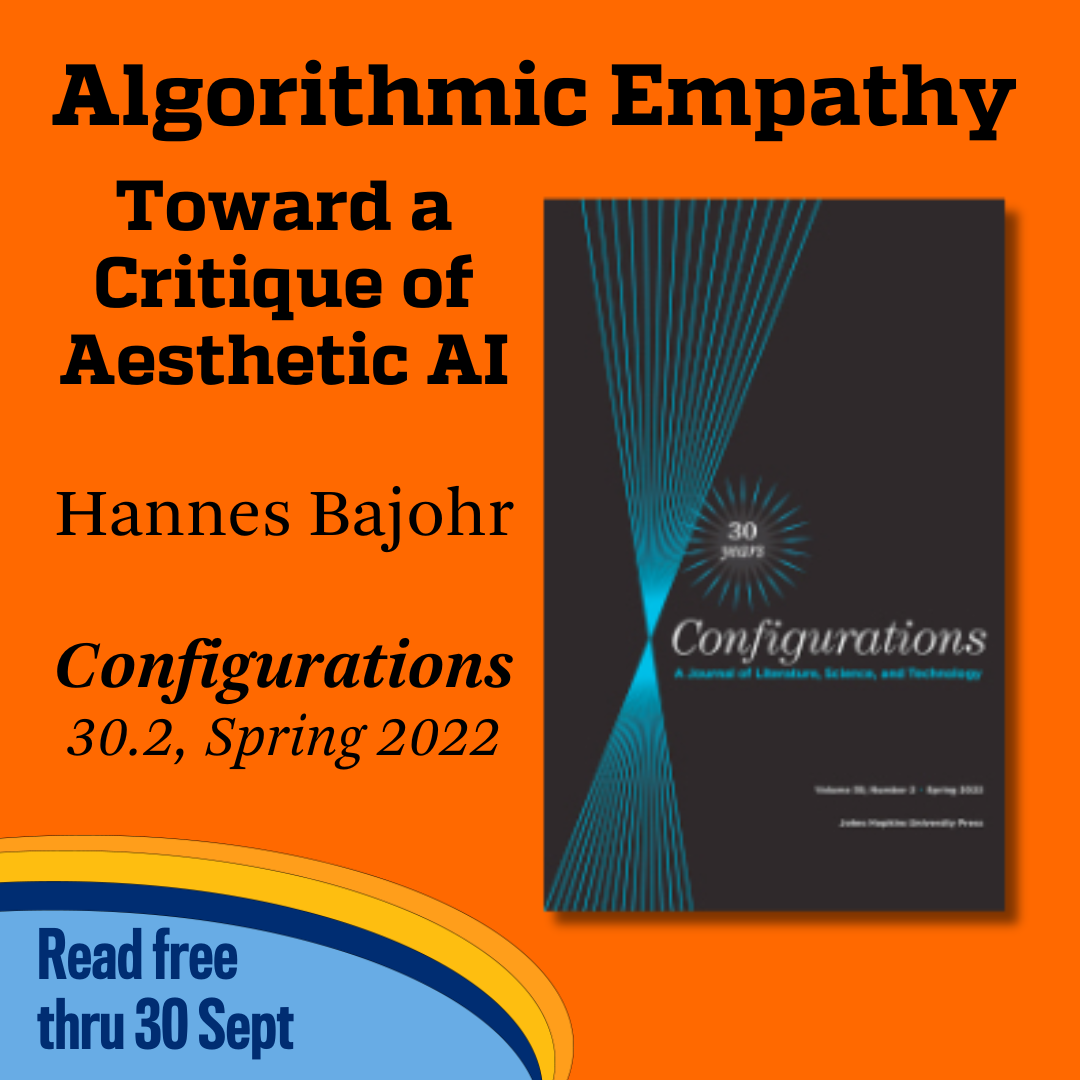
Algorithmic Empathy: Toward a Critique of Aesthetic AI
Hannes Bajohr
Configurations
Volume 30, Number 2, Spring 2022
To effectively critique aesthetic AI, we must not assess machine-made work by human standards, and instead examine the technical substrate of the work to determine critical criteria, argues Hannes Bajohr
Free in Configurations thru 30 Sept
Exploring the Potential of Generative AI (ChatGPT) for Foreign Language Instruction: Applications and Challenges
Antonio Pérez-Núñez
Hispania
Volume 106, Number 3, September 2023
In Hispania, Antonio Pérez-Núñez explores the potential and challenges of implementing ChatGPT in foreign language instruction
Free to read through 30 Sept
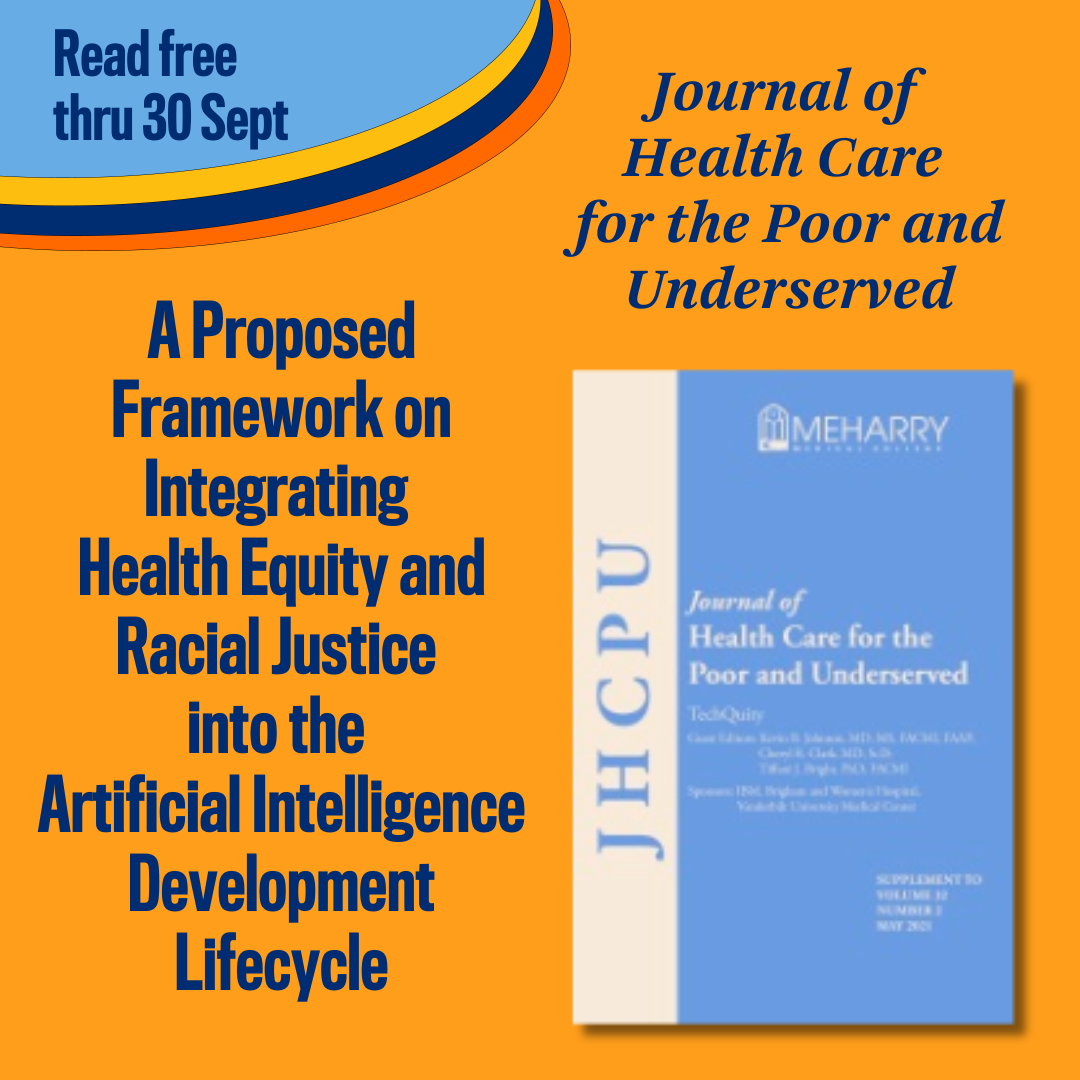
A Proposed Framework on Integrating Health Equity and Racial Justice into the Artificial Intelligence Development Lifecycle
Irene Dankwa-Mullan, Elisabeth Lee Scheufele, Michael E. Matheny, Yuri Quintana, Wendy W. Chapman, Gretchen Jackson, Brett R. South
Journal of Health Care for the Poor and Underserved
Volume 32, Number 2, May 2021 Supplement
In Journal of Health Care for the Poor and Underserved, a proposal for a framework centered on equity, justice, and ethical AI in order to elide structural inequities that can lead to disparate health outcomes for socially disadvantaged populations
Read free thru 30 Sept
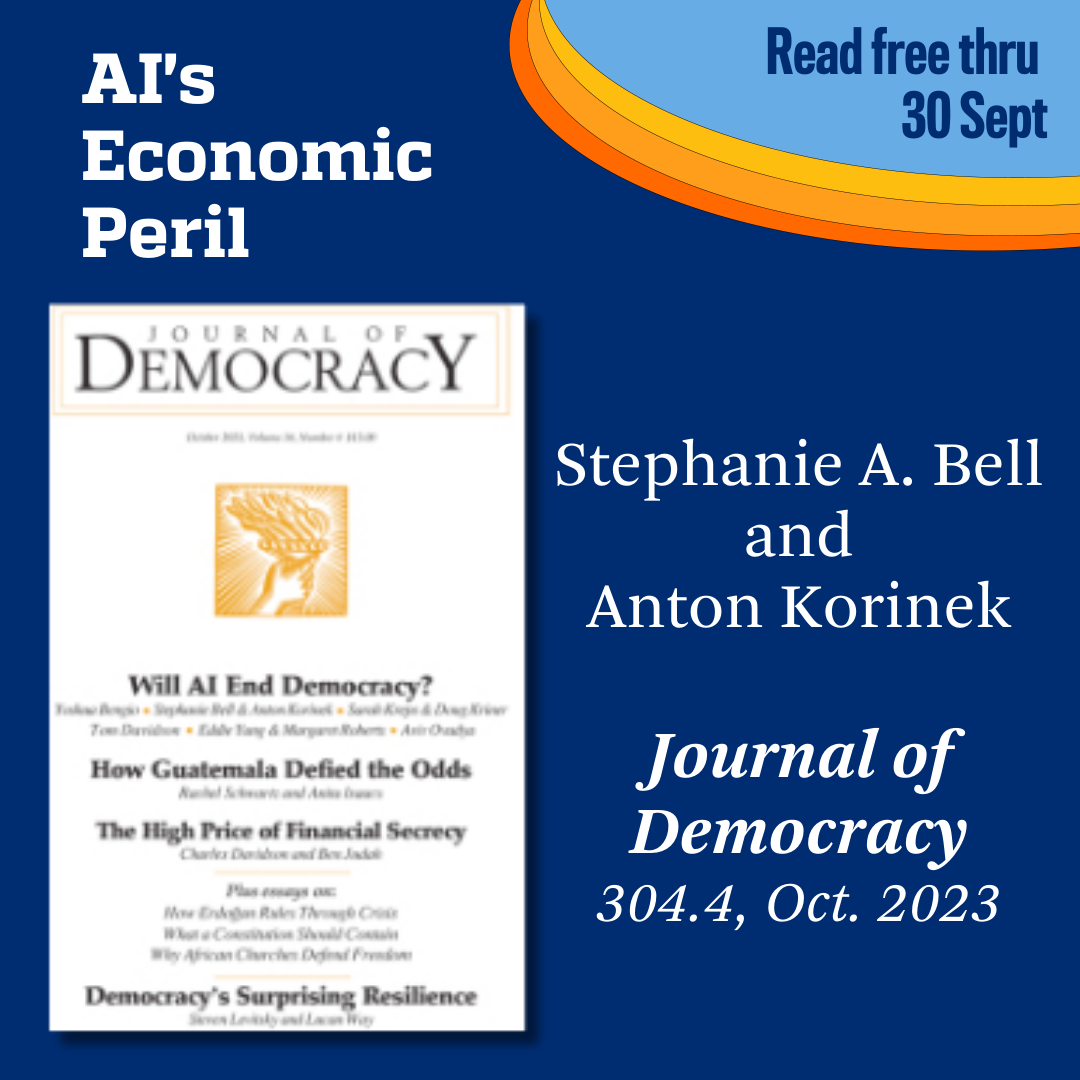
AI's Economic Peril
Stephanie A. Bell and Anton Korinek
Journal of Democracy
Volume 34, Number 4, October 2023
In Journal of Democracy, a call for policymakers to act swiftly to limit the labor market effects of rapidly developing AI systems, lest they aggravate inequality and undermine democratic governance
Read free thru 30 Sept
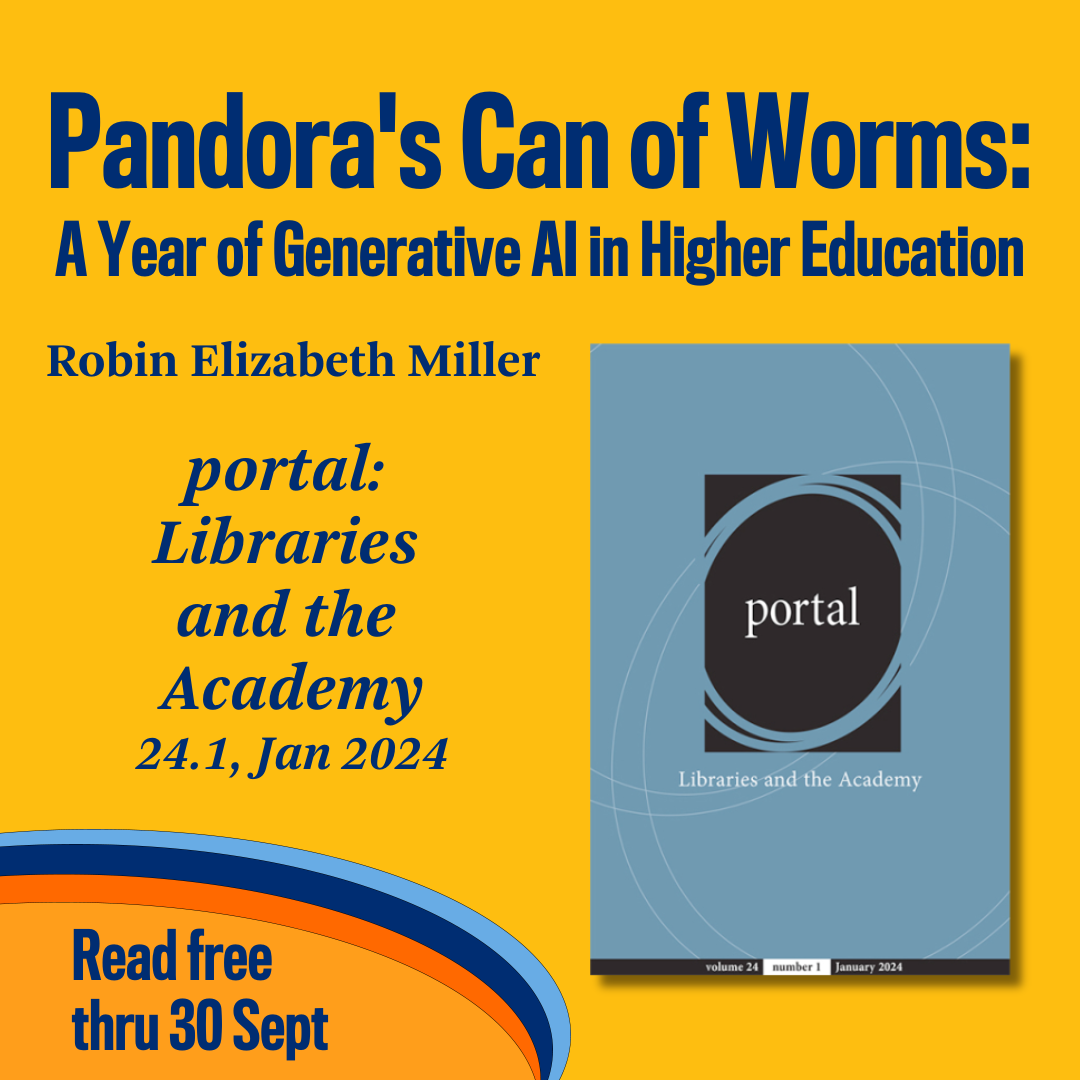
Pandora's Can of Worms: A Year of Generative AI in Higher Education
Robin Elizabeth Miller
portal: Libraries and the Academy
Volume 24, Number 1, January 2024
In portal: Libraries and the Academy, Robin Elizabeth Miller reports one university’s experience of engaging with generative AI and its implications for teaching, learning, research, and writing
Read free thru 30 Sept
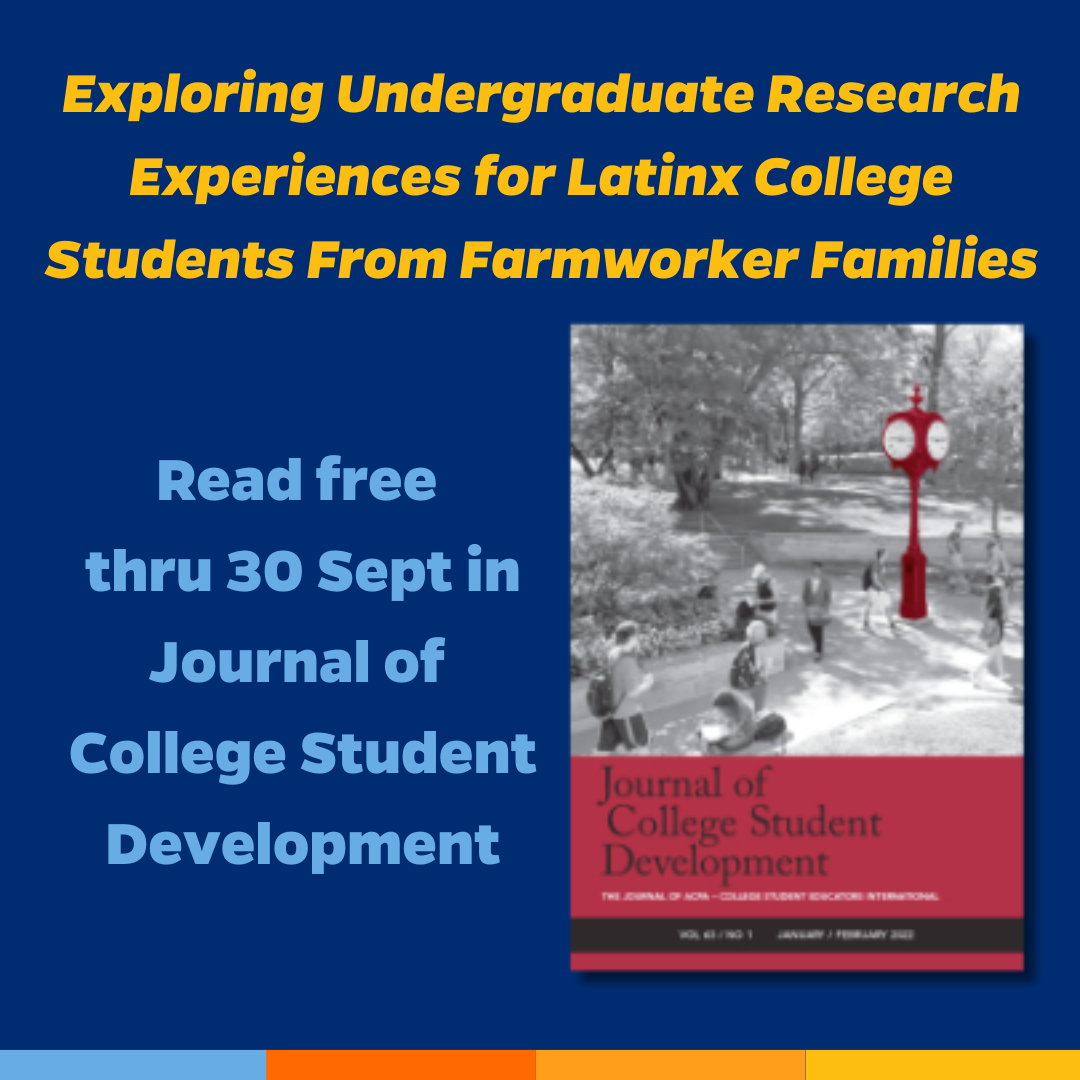
Exploring Undergraduate Research Experiences for Latinx College Students From Farmworker Families
Sneha A. Amaresh, Raúl Gámez, Catherine E. LePrevost, and Joseph G. L. Lee
Journal of College Student Development
Volume 63, Number 1, January-February 2022
Out now! The Hopkins Press Podcast talks with the research team "Exploring Undergraduate Research Experiences for Latinx College Students from Farmworker Families"
Subscribe with your favorite podcast app or find us at the Hopkins Press Podcast Page.
This article from Journal of College Student Development has consistently been among our most-read articles on Project MUSE in 2024!
Read free thru 30 Septemberhtt

Journal of Indian Ocean World Studies joins Hopkins Press
Philip Gooding
Journal of Indian Ocean World Studies
Volume 8, Number 1, 2024
We are thrilled to welcome Journal of Indian Ocean World Studies to the Hopkins Press roster as our first platinum open-access journal.
The new issue is out now, including new articles by Mathew Ruguwa and Hans Hägerdal, conversations with associate editor Philip Gooding, and more!
Read all about it at the Newsroom blog.

Ocean and Human Health in the Blue Era, Indian Ocean and African Perspectives
Rosabelle Boswell
Journal of Indian Ocean World Studies
Volume 6. Number 2, 2022
One of our State of the Field Essays: Boswell draws on her research in the Blue Humanities to make a rubric for integrating locally produced, embodied, and sensorial responses to the challenges of climate change in coastal and oceanic areas

Africa, the Indian Ocean World, and the ‘Early Modern’: Historiographical Conventions and Problems
Gwyn Campbell
Journal of Indian Ocean World Studies
Volume 1. Number 1, 2017
From the first issue: Campbell sets out what’s at stake in Indian Ocean World Studies, including the ability to contest Eurocentric framing devices. Here, he tackles temporal paradigms, especially the so-called ‘early modern’ period.

Reimagining the Aapravasi Ghat: Khal Torabully's poetry and the indentured diaspora
Shanaaz Mohammed
Journal of Indian Ocean World Studies
Volume 4. Number 2, 2021
Mohammed challenges current efforts to commemorate the period of indenture in Mauritius. She asks: How can literature inform cultural heritage, especially as they relate to indenture and other forms of bondage?
Ruth Mostern on The Yellow River: A Natural and Unnatural History
Ruth Mostern
Journal of Indian Ocean World Studies
Volume 7. Number 2, 2023
Mostern discusses her award-winning book, The Yellow River, in the JIOWS’ Conversations section. Readers learn of the methodological efforts that underpin one of the most celebrated books in environmental history from the last few years.
Children on Board: Child labor on ships in the Indian Ocean, c. 18th – 19th Centuries
Sundara Vadlamudi
Journal of Indian Ocean World Studies
Volume 6. Number 2, 2022
Vadlamudi centres the ocean itself in an important field of Indian Ocean World Studies: the history of slavery and bondage. He shows how children experienced sea voyages as labourers on ship and in the port.

MLN Forum: Translators Reimagine Literary Citizenship in the Academy
Eleni Theodoropoulos and Bradley Harmon
MLN
Volume 138, Number 5, December 2023
How and when will translation receive recognition for its crucial role in the academic ecosystem?
Spanning the Hopkins Press blog & 9 articles in a new special issue of MLN, it's a lively and thoughtful 10-scholar forum, open access for a year thru March 2025
